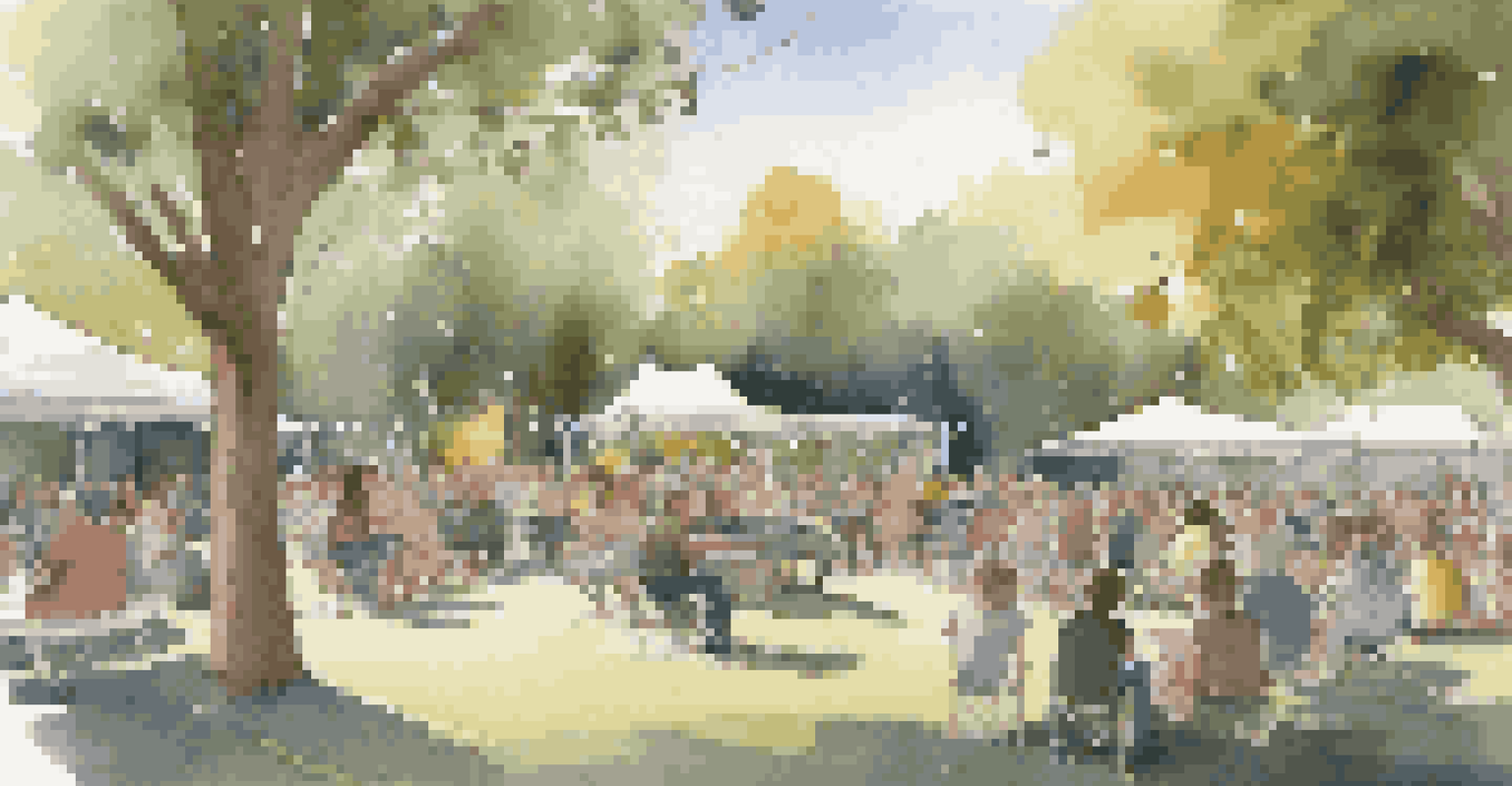The Future of Outdoor Live Music Events Post-Pandemic

The Resurgence of Outdoor Events in a Post-Pandemic World
As the world emerges from the shadows of the pandemic, outdoor live music events are experiencing a remarkable resurgence. Many people are eager to reconnect with their favorite artists and enjoy the communal experience that live music offers. The fresh air and open spaces of outdoor venues provide a safer alternative to indoor concerts, allowing attendees to gather while still maintaining some level of social distancing.
Music can change the world because it can change people.
This shift back to outdoor events reflects a broader trend toward valuing experiences that promote well-being and connection. Festivals that once filled stadiums are now reimagining themselves in parks and fields, focusing on creating intimate and memorable experiences. This evolution not only caters to health concerns but also taps into the growing desire for immersive, nature-infused events.
As we look to the future, expect more innovative outdoor concert formats that prioritize safety while maximizing enjoyment. Artists and organizers are finding creative ways to utilize outdoor spaces, ensuring that the magic of live music endures through changing times.
Health and Safety Protocols Shaping Concert Experiences
In response to the pandemic, health and safety protocols have become a cornerstone of outdoor live music events. Organizers are implementing measures such as contactless ticketing, temperature checks, and enhanced sanitation practices to reassure attendees. This new focus on safety aims to create a more comfortable environment, encouraging people to return to live music.

Additionally, many events are adopting flexible ticketing policies, allowing for refunds or exchanges if the situation changes. This adaptability fosters trust between attendees and organizers, making people feel more secure in their decision to attend a concert. The combination of safety measures and flexible policies is likely to become a standard expectation moving forward.
Outdoor Events Are Making a Comeback
As the world recovers from the pandemic, outdoor live music events are thriving, offering safer and more intimate experiences for attendees.
While these protocols may seem daunting, they ultimately serve to enhance the overall experience. By prioritizing health, organizers can focus on what truly matters: creating unforgettable performances that bring people together once again.
The Role of Technology in Enhancing Live Music Events
Technology has always played a key role in the evolution of live music, and its importance has only magnified post-pandemic. From live streaming concerts to virtual reality experiences, technology is bridging the gap for those who may not be able to attend in person. This hybrid model allows fans to engage with their favorite artists from anywhere in the world, expanding the reach of outdoor events.
The power of community to create health is far greater than any physician, clinic, or hospital.
Furthermore, event organizers are leveraging data analytics to better understand audience preferences and behaviors. This insight enables them to tailor experiences that resonate with attendees, making each concert feel uniquely curated. For example, personalized playlists or interactive experiences during events can create a deeper connection between artists and fans.
As we embrace this technological shift, expect to see more innovative uses of augmented reality and mobile apps designed to enhance live performances. These advancements not only enrich the concert experience but also create new opportunities for artists to connect with their audience.
The Importance of Sustainability in Future Events
Sustainability is becoming a key consideration in the planning of outdoor live music events. As environmental awareness grows, attendees are increasingly seeking eco-friendly practices from organizers. This trend is prompting festivals to adopt greener initiatives, such as reducing single-use plastics or providing recycling stations, to lessen their ecological footprint.
Many artists are also advocating for sustainability, using their platforms to promote environmental causes. By aligning with these values, organizers can attract like-minded audiences who are passionate about both music and the planet. This alignment creates a sense of community and shared purpose, enhancing the overall concert experience.
Health Protocols Enhance Concert Safety
Organizers are implementing health and safety measures, such as contactless ticketing and flexible policies, to reassure attendees and enhance their concert experience.
As we look to the future, sustainability will likely become a non-negotiable aspect of outdoor live music events. Attendees can expect to see creative solutions that prioritize both enjoyment and environmental responsibility, shaping a more sustainable music industry.
Diversity and Inclusivity in Outdoor Music Events
The pandemic has prompted a reevaluation of diversity and inclusivity in the music industry, particularly at outdoor events. There's a growing recognition of the need for a broader representation of artists and genres, making it essential for organizers to curate diverse lineups. This shift ensures that all voices are heard and celebrated, creating a richer experience for attendees.
Additionally, creating inclusive spaces at outdoor venues is vital for fostering a sense of belonging. Organizers are working to ensure that everyone, regardless of background or ability, can enjoy live music. This includes accessible seating, family-friendly areas, and programming that reflects the diverse community of music lovers.
As we move forward, expect to see an even greater emphasis on diversity and inclusivity in the planning of outdoor events. This commitment not only enriches the music experience but also promotes social cohesion and understanding among different communities.
The Evolution of Festival Formats and Experiences
Post-pandemic, the format of music festivals is evolving to meet the changing preferences of audiences. Traditional multi-day events are being reimagined to include smaller, more intimate gatherings that allow for deeper connections among attendees. These new formats often emphasize unique experiences, such as themed festivals that cater to specific genres or interests.
Moreover, pop-up concerts and surprise performances are becoming increasingly popular, creating buzz and excitement around outdoor music events. This spontaneity not only keeps audiences engaged but also allows artists to connect with fans in unexpected ways. The element of surprise can turn a simple concert into a memorable and shareable experience.
Sustainability and Inclusivity Matter
Future outdoor music events will prioritize sustainability and inclusivity, reflecting attendees' growing demand for eco-friendly practices and diverse representation.
As the landscape of outdoor music continues to evolve, expect organizers to experiment with different festival structures and formats. This willingness to innovate will ultimately lead to a vibrant and diverse array of music experiences, appealing to a broader audience.
The Future of Community Connection Through Music
One of the most significant lessons learned during the pandemic is the value of community connection, and outdoor live music events are poised to strengthen these bonds. As people gather to enjoy performances, they are also fostering a sense of belonging and support within their communities. Music has a unique ability to unite individuals, and this connection is more crucial now than ever.
Local artists and musicians are often at the heart of these gatherings, providing opportunities for community members to support one another. Organizers are increasingly showcasing local talent at outdoor events, highlighting the rich cultural tapestry of their areas. This focus on local artists not only boosts the economy but also nurtures a sense of pride and shared identity.

Looking ahead, the role of music as a catalyst for community connection will only grow stronger. Outdoor live music events will continue to serve as a platform for collaboration, creativity, and cultural exchange, bringing people together in meaningful ways.